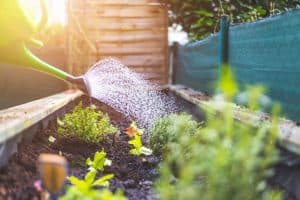Low humidity and the sun’s intense heat can cause dehydration of soil and plant moisture. Soil moisture regulates water and heat energy exchange between the land surface and the air through evaporation and plant perspiration. Therefore, soil moisture is crucial in forming weather patterns and producing precipitation.
There are many ways to retain dirt moisture levels. These may range from grass clippings to using shade cloth. So, keep reading to learn how to moisten your soils during summer.
Why You Should Keep Soil Moist During Summer
Summer is the hottest season, so you shouldn’t forget to hydrate your gardening dirt. Allowing your soil to dry could harden and make it difficult for your plants to develop. Avoid this by consistently watering your plants while monitoring the weather forecast. Water your soil first thing in the morning so it has time to absorb the water before the sun comes out.
Consider Adding Organic Mulch To Your Plant Soil
Mulches are materials applied to the ground’s surface to inhibit weeds, limit evaporation, slowly provide nutrients to the dirt, and enhance its structure.
Cover your soil with an organic blanket made of straw, leaves, shredded paper or cardboard, or bark to create a mulch. Mulches keep dampness in the soil for longer durations between watering. These will keep the soil cool, act as fertilizers, and decrease runoff.
Boost Water Retention
Enhancing your dirt’s liquid retention is something that every gardener should pay attention to. Your soil’s ability to remain wet should be consistent even in the hottest temperatures. As it maintains its moisture, your greenery and supply of crops will flourish. With extra care, your fruit trees, vegetables, and plants will grant you larger and greater crops.
Remove Weeds Regularly
Tilling the soil and removing the roots of the weeds are also crucial for reducing water evaporation and keeping the ground moist. Cultivating the soil regularly improves aeration and prevents water from gathering at the surface. Weeding your garden will help keep the soil moist since the weeds will not soak moisture from the garden base.
Frequently Asked Questions
How Do You Make Dry Soil Moist?
Combining organic materials with your soil is one of the most popular techniques to moisten dreary soil. These can improve the soil structure, making plants healthy and supporting growth. Organic matter may include compost, peat moss, coconut coir, etc. Oxygen is our most precious resource, but it will also absorb water, so try to add that media to prevent water loss and keep the moisture in your plants during heat seasons.
How Often Should I Water My Soil?
You don’t need to water your garden throughout the summer daily. Excess water supplied to the soil may lead to over-watering and soggy root systems. Instead of over-watering your potted plants, watering them on time is much better.
Some may already have their very own watering schedule. But for those who don’t know where to start, you can water once or twice weekly to retain soil moisture.
However, it’s different during hot seasons. Your soil will need more water to retain moisture and keep your plants hydrated. Consider watering your plants every three or four days during the summer.
What To Do If My Soil Is Too Dry?
When rainwater is limited and your garden soil is too dry, the first thing that might come to your mind is to water it. Yes, it is one of the common solutions, but there are other methods that you can consider to prevent soil erosion.
One way is by adding mulch. As mentioned in this article, mulch can keep your soil moist during hot weather while improving your dirt at the same time. Another method you can try is composting, specifically mushroom compost. The compost’s main purpose is to assist in maintaining your soil’s moisture. Aside from that, this compost can help break down your soil.
Value Soil Moisture Retention During Summer
Gardening and planting are never simple, and it can be more difficult for you and your plants during hot days. It would be best to remember to keep the dirt healthy using the proper fertilizer, giving shade using shade cloth, irrigation, and many more.
The summer heat can be hard on your gardens, but following the tips above will help keep them healthy and productive even in the hot season.



